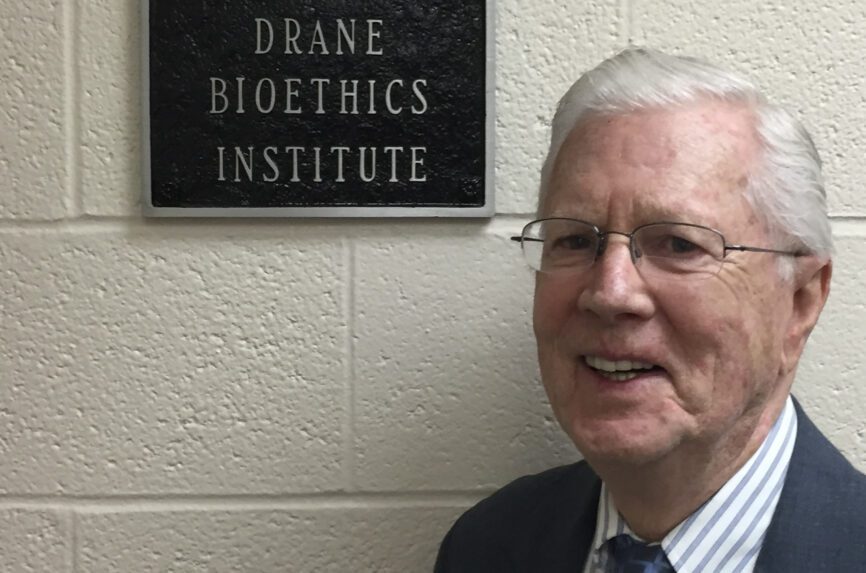James F. Drane (1930-2023)
James F. Drane, emeritus professor of philosophy and clinical bioethics at Pennsylvania Western University, Edinboro, died this past April.

Professor Drane is known as one of the founding figures of 20th Century biomedical ethics.
The following obituary is by Stephen J. Sullivan (Associate Professor of Philosophy) and Kiarash Amaresh (Associate Professor of Biology, Director of the Drane Bioethics Institute) of Pennsylvania Western University, Edinboro.
Obituary for James F. Drane (1930-2023)
by Stephen J. Sullivan and Kiarash Amaresh
Dr. James F. Drane—“Jim” to colleagues and friends, “Jimmy” to family—was Russell B. Roth Emeritus Professor of Biomedical Ethics when he passed away in April 2023 after a long and very distinguished career as a multilingual professor and scholar of philosophy, especially bioethics.
Jim was the eldest of ten children in a working-class, Irish Catholic family in southeastern Pennsylvania. It was largely through the priesthood (he was ordained in 1956) that he acquired a remarkable education that included a B.A. in Philosophy from Little Rock College, a B.D. in Theology from Gregorian University in Rome, an M.A. in Romance Languages from Middlebury College, and a Ph.D in Philosophy/Ethics from the University of Madrid. He went on to do postdoctoral work at Georgetown University, Union Theological Seminary, Yale University, and the Menninger School of Psychiatry. Jim taught at Little Rock College, Webster College, Warren State Hospital, and most of all Edinboro University (now known as Pennsylvania Western University, Edinboro), where he was a mainstay for many decades and both founder and first director of the James F. Drane Bioethics Institute. He also held visiting appointments at half a dozen other institutions, including the University of Madrid (which now has an annual lecture series in his name).
Jim got to know many important figures in the Catholic Church, including some who became popes; he considered the current pope, Francis, to be a personal friend. But his own relationship with the Church took a difficult turn in the late 1960s. As a conscientious and compassionate priest who counseled Catholic parents, he was troubled by Pope Paul VI’s 1967 encyclical Humanae Vitae, which unexpectedly reaffirmed traditional Catholic opposition to artificial birth control. Jim wrote and published an article that criticized the encyclical, and for that brave act he was essentially pushed out of the priesthood. He had never lived alone, and now he was on his own. It was then that he went to work at Yale University, for a short period, and traveled to many countries in a joint project with Daniel Callahan to explore international ethical perspectives on abortion. After the trip, and partly on account of a snowstorm, Jim landed at Edinboro University, where he founded the Bioethics Institute and received a generous donation from Dr. Russell B. Roth, president of the American Medical Association. Edinboro would become Jim’s beloved home for the rest of his life, and it is where he has been laid to rest—not in a Catholic cemetery (though he was a devout Catholic all his life) but in a nonsectarian one in which his grave lies next to the planned graves for two Jewish friends who offered him so much love and support in his final years. By the time Jim passed away, an overwhelming majority of American Catholics (including many priests and prominent Catholic ethicists) shared his support for birth control.
Jim’s contributions to the field of bioethics were enormous and outstanding. In addition to his important role in the establishment and development of bioethics in the United States, he played a crucial role in establishing the field in Spanish-speaking countries. In 2002 he was named one of the founders of the discipline of bioethics at the International Bioethics Conference in Brasilia, Brazil. His career as a bioethicist centered around appealing to virtue ethics to promote what he called “more humane medicine.” Jim expressed his concern about the medical professions becoming mere jobs and being guided by job descriptions written by administrators instead of by a genuine moral commitment to patients. He taught us that ethics is a lived set of obligations derived from a felt commitment to other persons, and that clinical ethics is a type of virtue ethics based on the relationship between healthcare providers and their patients.
Jim remained an outspoken liberal Catholic even when his words ruffled ecclesiastical feathers. But he was never meanspirited or antagonistic; he was known indeed for his thoughtfulness and gentleness as well as for his moral courage. And his scholarship, especially in bioethics, was formidable: not only hundreds of articles, book chapters, and professional presentations, but also a dozen books (some in Spanish in addition to or instead of English). Several of his most notable books are The Possibility of God (1976), Religion and Ethics (1977), Becoming a Good Doctor (1989), Making Life and Death Decisions for Others (1991), Clinical Bioethics (1994), and More Humane Medicine (2003).
Jim is survived by six sisters and brothers, many devoted nieces and nephews, and a legion of friends who will miss his warmth, intelligence, and decency. Rest in peace.
The foregoing will also be published in The Proceedings and Addresses of the APA.
Obituaries elsewhere:
Hastings Center
Legacy


What a moving obituary. I am inspired to do better in my personal and academic lives. Now I’ll do myself the favor of familiarizing myself with some of Dr. Drane’s work. I am grateful for examples like this man in academia.
Jim’s contribution is transcendental to the Church in Italy and the Church’s of North America. Ethics s they are devout Godly isn’t versus the Political views of North America, but just like any revolutionary stance, it must under great scrutiny. Jim’s contribution to the service of Philosophy and language shows exactly what ethics, metaethics, and now bioethics can conclude in our omniscient scheme for wisdom. Rest Up James.